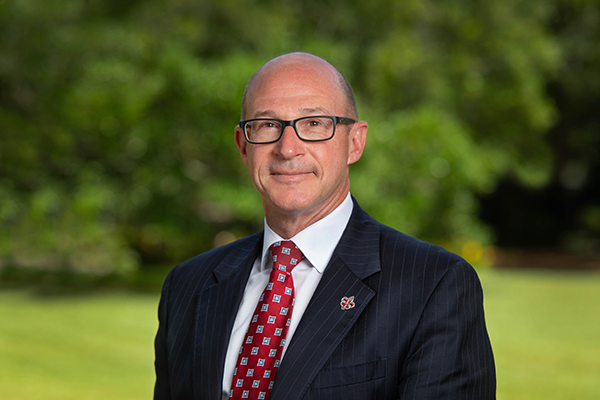The first anniversary of Dr. Jaimie Hebert’s appointment as provost and vice president for Academic Affairs is approaching. So is the “perfect storm.”
Hebert earned bachelor’s, master’s and doctoral degrees in mathematics from the University of Louisiana at Lafayette. The Abbeville, Louisiana, native then began a nearly 30-year career as a professor and administrator at universities in North Carolina, Texas and Georgia.
He was president of Georgia Southern University before returning to his alma mater as its chief academic officer on July 1, 2018.
In an interview, Hebert reflected on the past year and described the coming one as “the perfect storm” for UL Lafayette. In 2020, the University will undergo reaccreditation, launch a new Quality Enhancement Plan and set its strategic goals for the subsequent five years.
Question: How would you sum up the last year?
Dr. Jaimie Hebert: Fulfilling. I was excited when I received the news of my appointment as provost a year ago. I described it then as an opportunity to do what I love to do professionally at a place that means so much to me personally. You don’t always get those kinds of opportunities in life. The past year at this extraordinary institution and in this amazing community was every bit as special as I envisioned.
Q: Shortly following your appointment, you said how pleased you were with the changes your alma mater had experienced since your graduation. You also expressed gratitude that certain “good stuff” – the University’s ties to the community and its embrace of the area’s culture, for example – had not changed. Was there a moment in the past year that exemplified how the “good stuff” endures?
JH: There were actually many. One example involves a visitor to campus during the UL System Conference in February. She had never been to campus; in fact, she had never been to Acadiana. She decided to go for a walk alone.
Shortly after she set out, a student stopped her and asked if she needed help. When she told the student she was a visitor, the student spent the next 20 minutes walking with her around campus, showing her a University the student really loved. That’s a message you don’t hear from students on every campus, and that person was really astounded by the level of pride and the level of spirit that lives here.
Q: Next year is particularly significant for UL Lafayette. The University will undergo reaccreditation and launch a Quality Enhancement Plan as part of that process.
JH: Next year is kind of a perfect storm at the University. In addition, the University’s Strategic Plan is ending, so we’ll be developing a new strategic plan right about the same time we are going through reaccreditation and rolling out the QEP. Some people might think, oh, my, that’s too many things to do at once. For me, it’s not. It means it’s a great opportunity to meld together everything that’s going on at the University.
Q: Why is reaccreditation important?
JH: Federal guidelines require that every university maintain accreditation through a regional accrediting agency. We are accredited by the Southern Association of Colleges and Schools. SACS establishes a set of standards that define necessary levels of performance in all aspects of institutional operations. Reaccreditation is an evaluation that occurs every 10 years in which we must demonstrate that we are meeting these standards. We basically get a report card to see how we are performing.
Q: How does the Quality Enhancement Plan fit into that process?
JH: The QEP is a mandatory university project that must take place in conjunction with the reaccreditation timeline. It must be a project that is designed to enhance the quality of education delivered by the institution. It’s up to us what we will do, and which aspects of our educational opportunities we want to address.
We chose student research. It was a natural choice. Faculty members have always prided themselves on providing meaningful research experiences and other forms of experiential learning for our students. Even as an undergrad student here, I was pulled into research projects. The proposed QEP formalizes and institutionalizes this part of our academic culture in an effort to offer these opportunities to more students.
Q: Here’s a hypothetical. You are in an elevator with a group of prospective students. You have a limited amount of time to convince them to choose UL Lafayette. What’s your pitch?
JH: You would be hard pressed to find another research university anywhere in the nation that balances its research and undergraduate missions as well as we do at the University of Louisiana at Lafayette. You would likely not find another public institution that both embraces its local culture and infuses it into the academic mission like we do. We provide one of the most nurturing public university experiences you’ll find anywhere – and it’s delivered by and among the most wonderful people that you’ll ever meet.
Photo caption: Dr. Jaimie Hebert is UL Lafayette's provost and vice president for Academic Affairs. (Photo credit: Doug Dugas / University of Louisiana at Lafayette)
